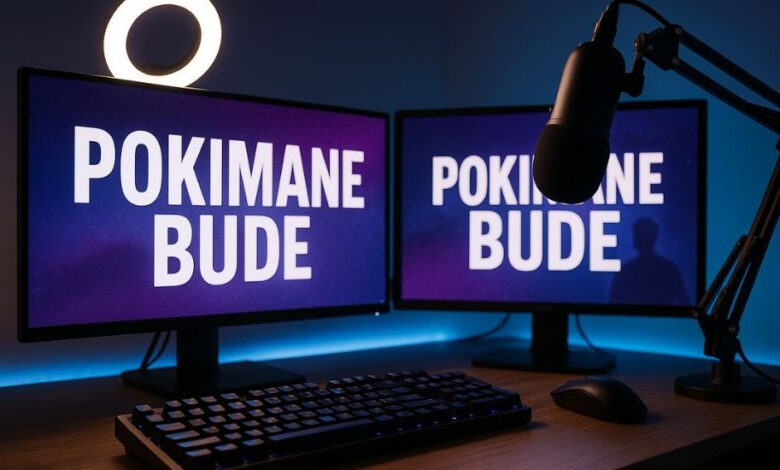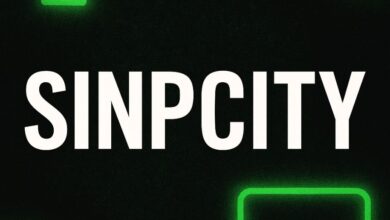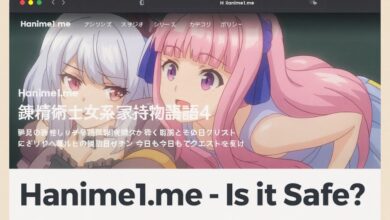Pokimane Bude: The Viral Meme Phrase Redefining Streamer Culture

When it comes to influencer culture, the internet has a habit of taking a single strange phrase, a misspelled word, or a random moment from a livestream and transforming it into something far bigger than anyone ever predicted. Sometimes it becomes a meme. Sometimes it becomes a trend. And sometimes — as with the phrase “Pokimane Bude” — it spirals into a full-blown digital curiosity that crosses platforms, rewrites SEO expectations, and sparks thousands of articles, explainers, and social media theories.
To someone stumbling upon the term for the first time, “Pokimane Bude” looks like a typo, maybe a mispronunciation, or even some kind of inside joke you’re not cool enough to know yet. But spend more time diving into what’s happening across TikTok, Twitter/X, Reddit threads, YouTube comment chains, upstart blogs, and viral content farms, and you’ll quickly realize the phrase isn’t random at all.
In fact, Pokimane Bude has become its own micro-phenomenon — an example of how fandoms, algorithms, streamer culture, and internet linguistics collide to create something with no fixed meaning yet massive cultural impact. To truly understand the “Pokimane Bude” effect, you also have to understand the woman at the center of it: Pokimane, one of the most influential digital personalities of the last decade.
So let’s unpack everything — the meme, the meaning, the mystery, and why this odd little phrase has grown into such a recognizable keyword across blogs, SEO spaces, and internet culture commentary.
Who Is Pokimane? The Influence Behind the Meme
Before diving into the “bude” of it all, it’s important to establish who Pokimane is beyond the meme.
Pokimane, real name Imane Anys, is a Moroccan–Canadian content creator who rose to prominence through Twitch, YouTube, and the larger gaming ecosystem. For years, she has held the title of one of the most-followed female streamers in the world. Her streams have ranged wildly in genre — from League of Legends gameplay to cozy chatting sessions, from collaborative content with OfflineTV to cultural commentary, reactions, IRL streams, and podcast-style discussions.
Over time, her online presence grew into a distinct brand: stylish, outspoken, approachable, and undeniably culturally relevant.
And where cultural relevance exists, memes inevitably follow.
Pokimane has been the subject of countless internet jokes over the years — some lighthearted, some chaotic, some tied to community drama, and some carried entirely by fan-generated humor. Every large creator deals with this, but Pokimane’s audience in particular has always been known for its liveliness and meme productivity.
Which leads us to the strange rise of the term… Pokimane Bude.
What Does “Pokimane Bude” Even Mean?
The short answer?
Nothing and everything — all at once.
One of the defining features of modern meme evolution is that context is optional. A phrase doesn’t need a meaning; it needs viral potential. And “Pokimane Bude” happens to check all the boxes of a phrase primed to go viral:
-
It’s short
-
It’s weird
-
It’s catchy
-
It looks like a typo or slang
-
It sounds like it should be an inside joke
-
It’s easy to attach to any meme template
-
It triggers curiosity (“Wait, what does this mean?”)
The earliest appearances of “Pokimane Bude” floating around meme pages and short-form content platforms look like:
-
TikTok edits using the phrase as a caption
-
YouTube thumbnails using the keyword for reaction content
-
Low-effort meme posts adding “Pokimane Bude” for comedic confusion
-
Blog articles using the term purely for SEO purposes, knowing fans would click out of curiosity
-
Social media posts intentionally using the phrase to create engagement
In other words, “Pokimane Bude” functions like an internet Rorschach test — people project meaning onto it, even if the phrase never intended to have one.
Some fans insist it’s a stylized way of saying “buddy” (i.e., Pokimane buddy → Pokimane bude). Others treat it as slang for “Pokimane moment.” Some blogs stretch it into a symbol of her “digital evolution” or “internet era identity.” Many use it as an umbrella phrase for anything related to Pokimane’s impact on streaming culture.
But whether you think it’s a typo, intentional slang, or a meme phrase with no inherent meaning, what really matters is this:
The internet decided the phrase was catchy.
And once the internet decides, the cycle begins.
How the Internet Turns Nonsense Words Into Cultural Moments
To understand why “Pokimane Bude” caught on, you have to understand the life cycle of modern micro-memes:
1. Step One: A Random Phrase Appears
Sometimes from a stream. Sometimes from a fan. Sometimes from a comment. Sometimes from absolutely nowhere.
2. Step Two: People Start Using It Ironically
Because the phrase is funny, nonsensical, or “ugly” enough to become aesthetically amusing.
3. Step Three: The Algorithm Picks It Up
Platforms like TikTok, YouTube Shorts, and Instagram Reels love repeated phrases. They start pushing content using the term because repetition signals trend-worthiness.
4. Step Four: SEO Farms & Blogs Intercept
Once a term gains traction, content sites see an opportunity. They write explainers and long-form articles (like this one) to catch the search demand.
5. Step Five: The Meme Becomes Larger Than Its Origin
Eventually the phrase becomes detached from the original context entirely. At this point, it belongs to the culture, not the creator.
“Pokimane Bude” fits this formula perfectly — it is the result of ironic usage, algorithmic amplification, and fandom creativity blending into something bigger.
Why Pokimane Specifically Inspires Meme Culture
Pokimane is a unique figure in the digital creator space. She isn’t just popular — she’s memeable in a way that many mainstream creators aren’t. Here’s why:
1. She Has a Strong, Vocal, Organized Community
Pokimane fans — and haters — are extremely active in discourse, edits, debates, and inside jokes.
2. She Exists at the Crossroads of Many Internet Subcultures
Gamers
Stream enjoyers
Short-form content fans
Reddit users
VTuber watchers
Memers
YouTube reactors
Drama channel audiences
Algorithmic meme pages
All these communities overlap in the “Pokimane sphere,” making her an ideal subject for meme propagation.
3. She’s Both Approachable and Iconic
Pokimane maintains a friendly, casual persona, but she’s also undeniably an icon in streaming culture. That mix creates an environment where fans feel comfortable turning her into a symbol, a character, or a meme figure without malice.
4. She’s Been Relevant Long Enough to Develop Internet Lore
Every creator has moments. Pokimane has eras. Each era inspires its own mini-memes — and phrases like “Pokimane Bude” become part of that long-term, evolving lore.
The SEO Takeover: Why Blogs Love Using the Phrase “Pokimane Bude”
If you search the term today, you’ll see dozens of blogs using the keyword — sometimes entire articles, sometimes subheadings, sometimes as filler SEO phrases. Why?
1. Curiosity = Clicks
People Google the phrase to figure out what it means. Blogs love curiosity traffic.
2. It Sounds Like a Meme Explained
And “meme explainers” are some of the highest-performing blog formats across the internet.
3. Pokimane Is a Trending Subject
Anything tied to Pokimane — bio, drama, updates, memes — performs well in search and social shares.
4. “Bude” Looks Like a Keyword With Low Competition
So smaller sites adopt it as a niche phrase to try ranking for.
5. The Phrase Is Flexible
Writers can attach it to:
-
biography pieces
-
internet culture analysis
-
streaming commentary
-
meme explainers
-
entertainment news
This adaptability makes it a keyword that fits into multiple website categories.
In essence, “Pokimane Bude” became not just a meme — but an SEO weapon.
Pokimane Bude as a Cultural Mirror
Even if the phrase originally meant nothing, its evolution represents something much bigger:
1. How fast culture now moves
Micro-trends explode and evaporate within days. “Pokimane Bude” is part of that landscape.
2. How fandoms shape influencer identity
Pokimane’s fans play as much of a role in defining her public image as she does.
3. How algorithms dictate cultural memes
If TikTok likes a word, the culture shifts around the word.
4. How the internet finds humor in nonsense
Absurdity is the internet’s mother tongue.
5. How a creator’s brand can grow through chaos
Even weird memes become brand touchpoints — strengthening awareness rather than harming it.
The phrase reflects the strange new era where creators don’t just produce content; they inspire ecosystems of language, jokes, interpretations, and viral artifacts that swirl around them like digital weather patterns.
The Linguistic Angle: Why Strange Words Go Viral
“Pokimane Bude” has the perfect linguistic profile for memeability:
-
Two syllables
-
Simple consonants
-
Looks like an inside joke
-
Sounds like gamer slang
-
Feels unpolished (which Gen Z loves)
Words like “sus,” “pog,” “yeet,” “simp,” “based,” and “oof” didn’t explode because they made sense. They exploded because they felt right in the rhythm of internet-speak.
“Bude” fits that mold.
It flows well.
It looks quirky.
It’s a perfect caption word.
And once people start repeating it, linguistics takes a back seat — momentum drives meaning, not the other way around.
Pokimane Bude and the Meme Ecosystem
If you zoom out, “Pokimane Bude” doesn’t stand alone — it’s part of a larger pattern of streamer-lore vocabulary.
Examples include:
-
“Jschlatt arc”
-
“Dream SMP lore moment”
-
“Amouranth meta”
-
“Kai Cenat era”
-
“Ninja blue hair phase”
-
“xQc juicer”
-
“Slicker scandal era”
These terms get exaggerated, simplified, spread, and adopted ironically before becoming semi-serious descriptors for fandom conversation.
“Pokimane Bude” joins that broader list — a kind of semiotic shorthand the internet uses to reference both the streamer and the culture surrounding her.
Does Pokimane Herself Acknowledge the Phrase?
At the time of writing, Pokimane hasn’t created an official definition. And honestly?
That’s probably for the best.
Memes often die when creators try too hard to “claim” or explain them.
Their power lies in being community-controlled.
Pokimane’s relationship with memes has always been healthy — she sometimes laughs with them, sometimes ignores them, and sometimes subtly acknowledges them without overclaiming them. This balanced approach keeps memes alive longer and gives fans ownership of the joke.
So even without Pokimane’s direct comment, the meme thrives.
Why “Pokimane Bude” Isn’t Going Away Anytime Soon
Some memes are momentary. Others have longevity because they check certain boxes:
-
They’re attached to a major figure
-
They’re easy to reuse
-
They’re visually funny
-
They match internet linguistic patterns
-
They’re adaptable
-
They spark curiosity
-
They’re fun to say
“Pokimane Bude” checks every single one.
Its ability to thrive in SEO, TikTok captions, meme pages, YouTube thumbnails, Twitter/X jokes, and Discord server chats makes it unusually durable for a nonsense phrase.
It may not always be huge, but it probably won’t disappear either — it’ll settle into the ecosystem of streamer-lore vocabulary that resurfaces whenever fans need a playful, absurdist phrase.
What “Pokimane Bude” Ultimately Represents
If you boil it down, the phrase symbolizes:
✔ how creators become cultural symbols
✔ how fan communities shape narratives
✔ how algorithms amplify micro-memes
✔ how nonsense becomes entertainment
✔ how digital culture builds shared language
✔ how SEO latches onto trends
✔ how personality-driven fandoms evolve
It’s more than a phrase — it’s a snapshot of internet behavior.
Conclusion: The Era of Pokimane Bude
At first glance, “Pokimane Bude” is nothing more than a meme phrase floating around the internet like many before it. But dig deeper, and it becomes a perfect case study of how modern culture works: chaotic, collaborative, algorithm-driven, ironic, and endlessly creative.
Pokimane, as a cultural figure, has inspired memes for years — but this one is unique in that it isn’t tied to a specific clip, drama, or moment. It’s tied to the existence of Pokimane herself and how her presence interacts with the hyper-memeable machinery of the internet.
Whether you’re a fan, a curious onlooker, a content creator, or someone researching internet linguistics, “Pokimane Bude” offers a fascinating example of how language evolves in real time, shaped not by dictionaries but by communities, trends, and digital humor.
And as long as the internet keeps loving random absurdity — this phrase isn’t going anywhere.
This article is published for the readers of Blog Loom, your home for the newest digital-culture insights.
You may also read: Gayfirir: Meaning, Identity, and Cultural Impact Explained




